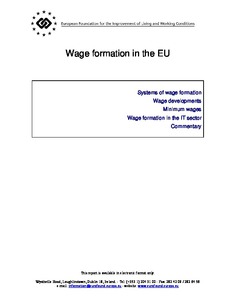Wage formation in the EU
"his report examines wage formation in the EU from a range of perspectives. It analyses the main systems of wage formation in operation and looks at the main wage developments of the past five years. This includes an overview of recent sectoral agreements, along with an analysis of trends at co...
| Main Author: | |
|---|---|
| Institution: | ETUI-European Trade Union Institute |
| Format: | TEXT |
| Language: | English |
| Published: |
Dublin
2009
European Foundation for the Improvement of Living and Working Conditions |
| Subjects: | |
| Online Access: | https://www.labourline.org/KENTIKA-19188904124919061869-Wage-formation-in-the-eu.htm |
| Summary: | "his report examines wage formation in the EU from a range of perspectives. It analyses the main systems of wage formation in operation and looks at the main wage developments of the past five years. This includes an overview of recent sectoral agreements, along with an analysis of trends at company level and of the social partners’ views. The report also explores key issues pertaining to the minimum wage, including how national rates are set and upgraded. The final section of the report analyses wage formation in the dynamic and fast-growing IT sector, which tends to yield higher wages than elsewhere in the economy. Among the report’s findings are the variable levels of wage growth across the EU countries, along with the widespread use of individualised pay and other variable pay elements at company level.
The study was compiled on the basis of individual national reports submitted by the EIRO correspondents. The text of each of these national reports is available below. The reports have not been edited or approved by the European Foundation for the Improvement of Living and Working Conditions. The national reports were drawn up in response to a questionnaire and should be read in conjunction with it. " |
|---|---|
| Physical Description: | 37 p. Digital |

